Appointments
Call Us At:
013 243 1632 or 086 166 4664
Queries
Email Us At: eye@drcronje.com
Office Hours
Mon - Fri: 8:00 AM - 5:00 PM
Sat: By Appointment Only
Call Us At:
013 243 1632 or 086 166 4664
Email Us At: eye@drcronje.com
Mon - Fri: 8:00 AM - 5:00 PM
Sat: By Appointment Only
Cataracts are one of the most common causes of vision loss — but they’re also one of the most treatable. Whether you’re noticing changes in your own eyesight or guiding patients through care decisions, understanding cataracts is the first step toward clearer vision.
This comprehensive guide covers everything you need to know, from what causes cataracts and how they are diagnosed, to how surgery works, the types of lenses available, and what recovery looks like. It’s designed for both patients seeking clarity and healthcare professionals supporting timely, informed referrals.
A cataract is a clouding of the eye’s natural lens, which sits just behind the iris. The lens focuses light onto the retina, allowing you to see clearly. When a cataract develops, the lens becomes increasingly cloudy, causing blurred vision and eventually making it difficult to carry out everyday tasks. Cataracts can occur in one or both eyes, but they don’t spread from one eye to the other.
Cataracts are most commonly associated with aging, but they can also develop due to other causes. The proteins in the lens naturally degrade and clump together with age, leading to cloudiness. Additional risk factors include:
A family history of cataracts
Chronic conditions such as diabetes or hypertension
Prolonged UV exposure without proper eye protection
Smoking and excessive alcohol use
Long-term use of corticosteroid medications
Eye trauma, inflammation, or previous surgery
While there’s no guaranteed way to prevent cataracts, certain lifestyle choices may help delay their onset. These include wearing sunglasses with UV protection, avoiding smoking, managing underlying health conditions, and maintaining a nutrient-rich diet with plenty of antioxidants.
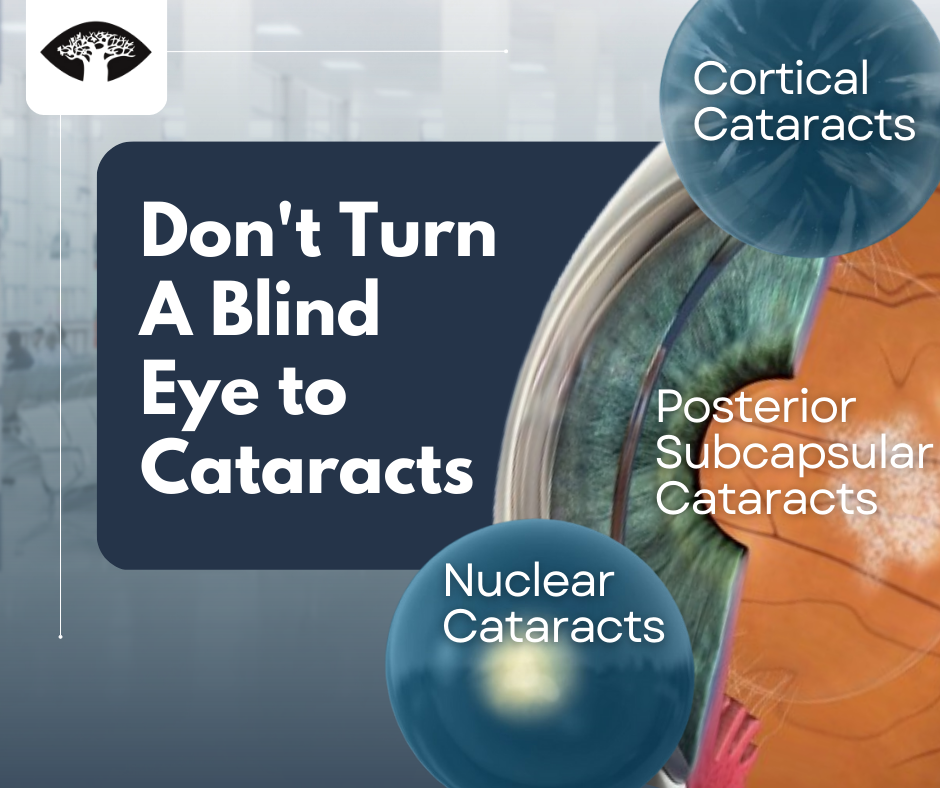
The development of cataracts can be a natural part of aging, but it doesn't have to mean the end of clear vision. By seeking early diagnosis and treatment from an
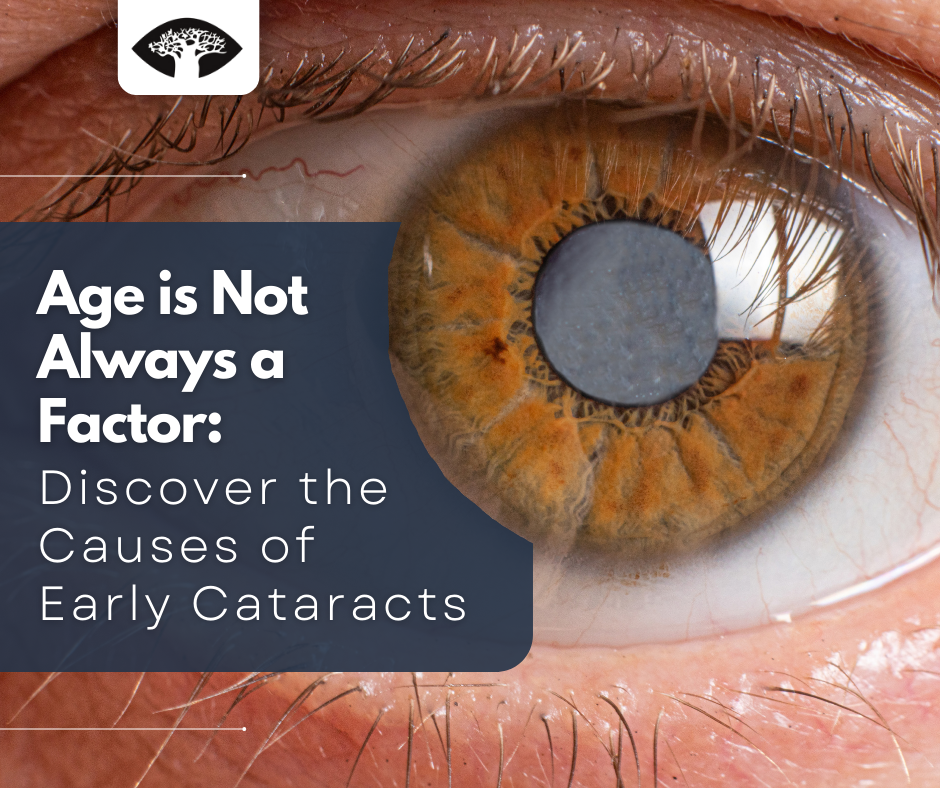
Cataracts are the clouding of the eye’s natural lens, which can lead to vision loss. This clouding can occur gradually over time and is often a normal part of aging.
Because cataracts develop gradually, symptoms can be easy to miss at first. Many people only become aware of the condition once vision noticeably declines. Common signs include:
Cloudy, blurry, or dim vision
Increased glare or sensitivity to light
Colors appearing dull or faded
Halos around lights
Difficulty with night vision
Frequent changes in eyeglass prescriptions
These changes can interfere with daily activities like reading, driving, or recognizing faces. If you or your patients are experiencing any of these symptoms, it’s important to schedule a comprehensive eye exam.
Diagnosing cataracts begins with a thorough eye exam. Your eye specialist may perform several tests to assess the clarity of the lens and overall eye health:
Visual acuity test: Measures the sharpness of vision at various distances.
Slit-lamp examination: Magnifies the front structures of the eye to evaluate lens cloudiness.
Dilated pupil exam: Allows the retina and back of the lens to be clearly seen.
Tonometry: May be used to measure intraocular pressure, particularly if other conditions are suspected.
Cataract surgery is recommended when vision loss from cataracts begins to interfere with daily life. While early cataracts can be managed with brighter lighting or stronger glasses, surgery is the only effective way to restore lost vision.
If your ability to read, drive, work, or maintain independence is affected, it’s likely time to consider surgery.
At Dr. Cronjé’s practice, cataract surgery is performed using a technique called phacoemulsification. This method is safe, efficient, and widely used:
A small incision is made in the eye.
The cloudy lens is broken up using ultrasound.
The lens fragments are removed.
A folded intraocular lens (IOL) is inserted in place of the old lens.
The procedure typically takes 15–30 minutes and is done under local anesthetic, often with medicine to help you relax. Most patients go home the same day.
Laser-assisted cataract surgery uses a femtosecond laser to perform certain steps with precision. However, studies show no significant advantage in visual outcomes for most standard cases. At our clinic, we perform traditional surgery due to its excellent safety record and consistent results.
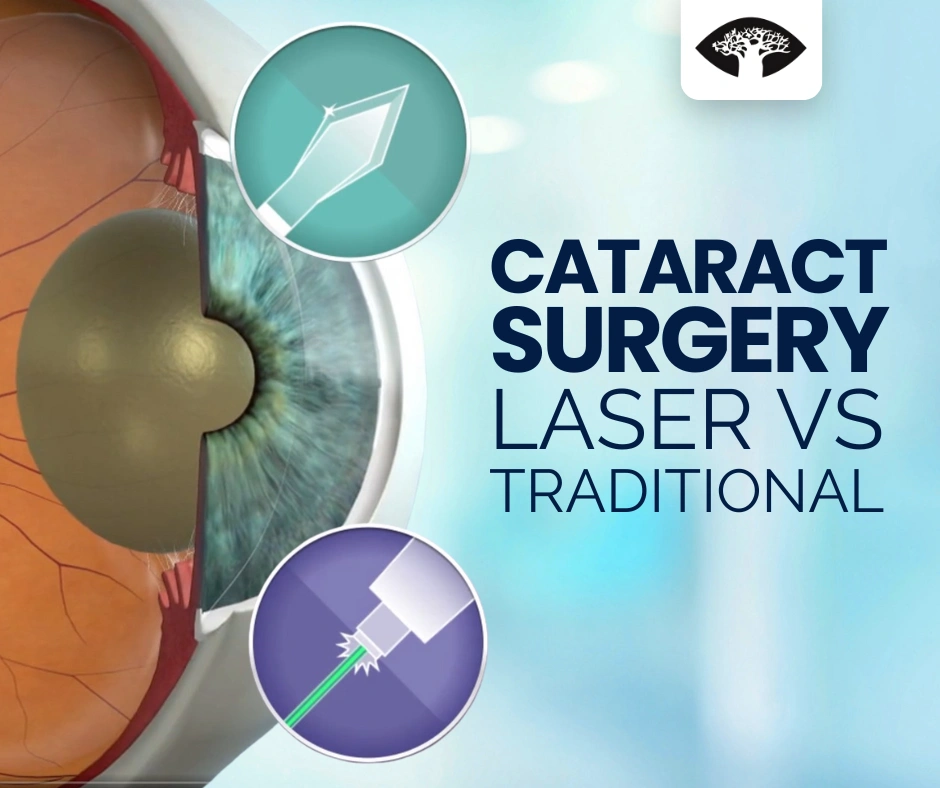
Explore cataracts surgery options, including traditional and laser-assisted techniques, and learn what to expect before, during, and after surgery to restore your vision.
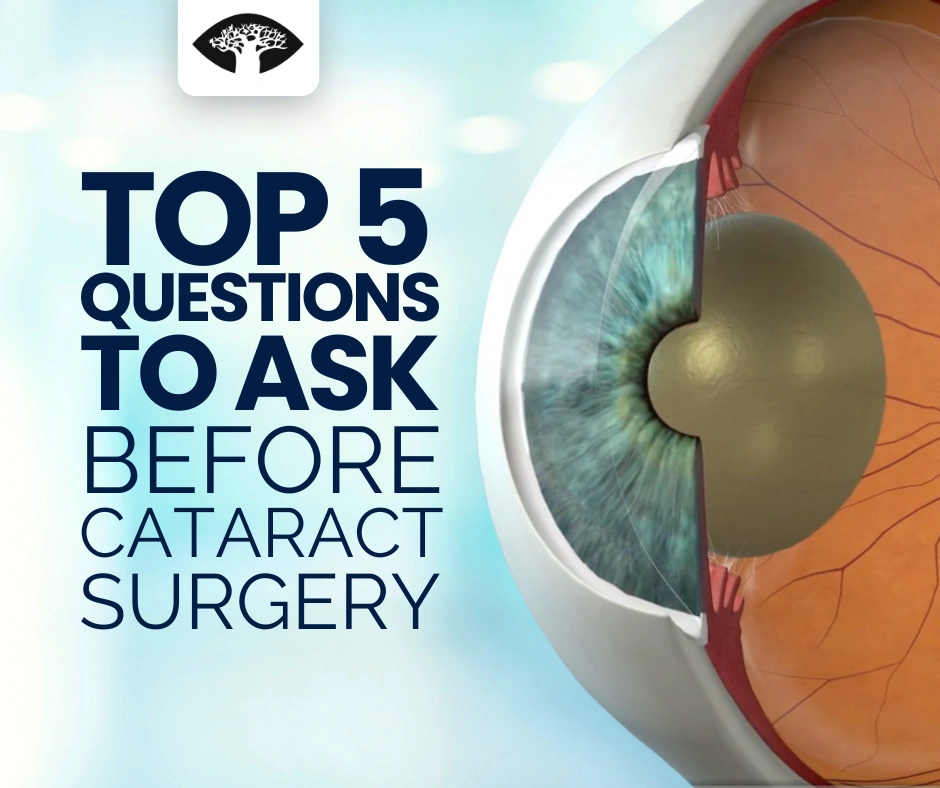
Cataract surgery is a safe and effective way to restore vision. Learn the five key questions to ask your ophthalmologist before surgery to ensure the best outcomes for your eye
Choosing the right IOL is a key part of surgical planning. The lens becomes a permanent part of your eye, so the type selected will impact your post-operative vision.
Monofocal lenses: Provide clear vision at one distance (usually far). Reading glasses are typically still needed.
Toric lenses: Correct astigmatism and improve clarity for patients with irregular corneas.
Multifocal or EDOF lenses: Help reduce dependence on glasses by allowing for clearer vision at multiple distances, though some glare or halos may occur.
Dr. Cronjé will help you select the lens best suited to your vision needs and lifestyle goals.
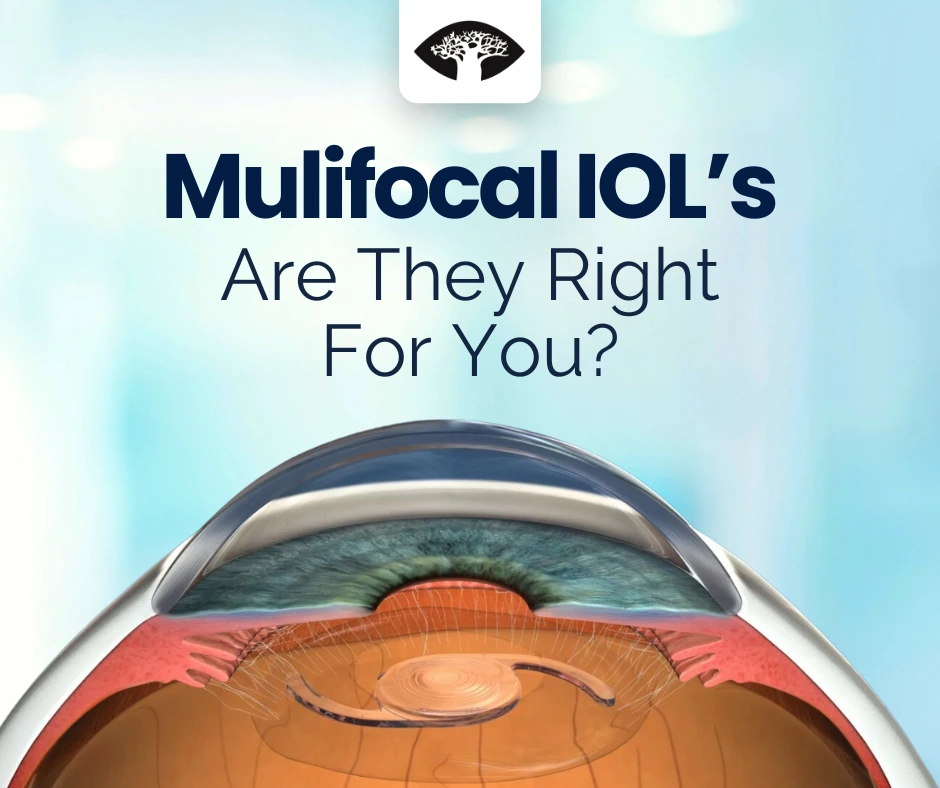
Multifocal intraocular lenses improve vision at various distances after cataract surgery, reducing the need for glasses and offering a practical solution for patients seeking clearer, more functional eyesight.
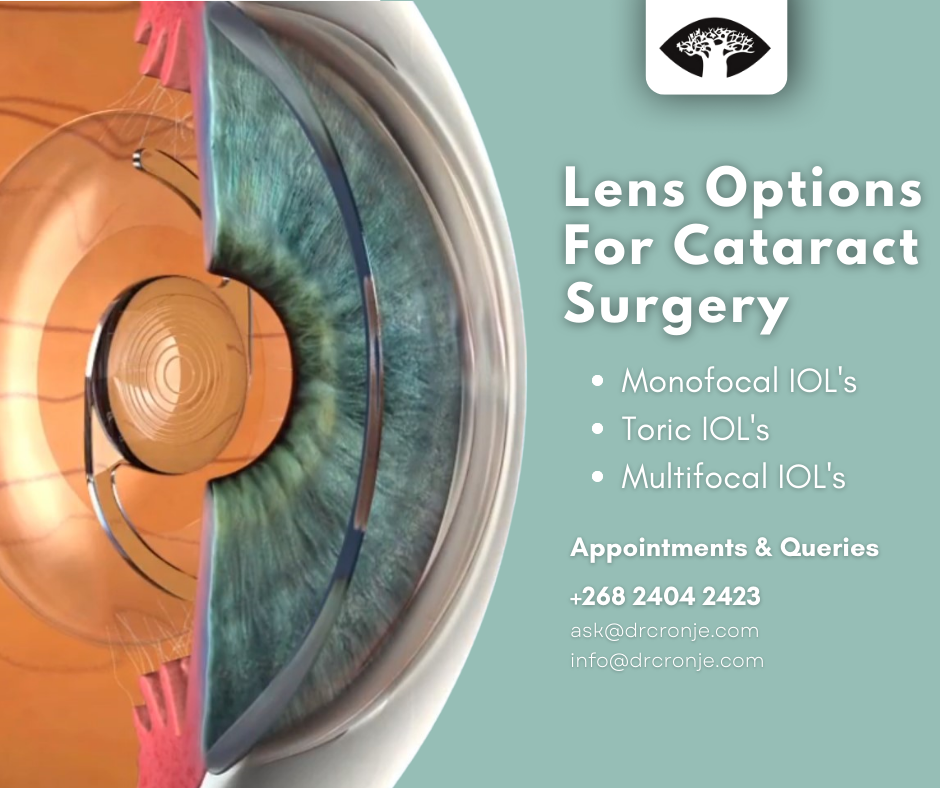
The Right IOL for Your Lifestyle Find the Perfect Lens for Your Cataracts Are you looking for the right lens for your cataracts? No doubt, cataract is a common eye
Most people notice improvement in vision within a few days. Full recovery generally takes about 4–6 weeks. Mild discomfort, light sensitivity, or a gritty sensation are normal and usually temporary.
Use prescribed eye drops to reduce inflammation and prevent infection
Wear an eye shield at night for the first few days
Avoid rubbing your eye or doing any heavy lifting
Protect your eye from bright sunlight with sunglasses
Attend all scheduled follow-up appointments
If surgery is needed in both eyes, the second procedure is typically done within 1–4 weeks after the first.

Cataract surgery recovery is quick, with most patients noticing clearer vision within days. Learn what to expect post-surgery, including tips for healing, managing symptoms, and ensuring a smooth recovery process.
Most people notice improvement in vision within a few days. Full recovery generally takes about 4–6 weeks. Mild discomfort, light sensitivity, or a gritty sensation are normal and usually temporary.
Use prescribed eye drops to reduce inflammation and prevent infection
Wear an eye shield at night for the first few days
Avoid rubbing your eye or doing any heavy lifting
Protect your eye from bright sunlight with sunglasses
Attend all scheduled follow-up appointments
If surgery is needed in both eyes, the second procedure is typically done within 1–4 weeks after the first.
Whether you’re seeking treatment or helping patients plan their next step, understanding cataracts empowers better decisions. With early detection, skilled surgical care, and thoughtful lens selection, cataract treatment can lead to significant improvements in vision and quality of life.
Please provide two possible dates that suit you, we will revert to you to discuss availability according to Dr. Cronje’s schedule.
All information provided below is private and protected by the POPI act

Call Us At:
013 243 1632 or 086 166 4664
Email Us At: eye@drcronje.com
Mon - Fri: 8:00 AM - 5:00 PM
Sat: By Appointment Only
The information on this website is for educational purposes only and is not a substitute for professional medical advice, diagnosis, or treatment. Please consult Dr. Cronje for specific eye health concerns.